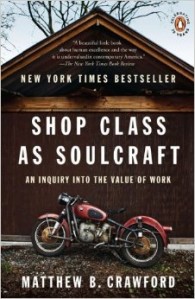Reclaiming the honor of working with our hands…

When a philosopher no longer wants to be a philosopher, he may have several career options. But motorcycle mechanic is not one that comes readily to mind.
Nonetheless, that is the path taken by Matthew Crawford, who holds a PhD in political philosophy from the University of Chicago. With a short career at a think tank and several years of “pulling wrenches” behind him, Crawford argues that the time is ripe to reconsider “an ideal that has fallen out of favor: manual competence.”
Today, in our schools, the manual trades are given little honor. The egalitarian worry that has always attended tracking students into “college prep” and “vocational ed” is overlaid with another: the fear that acquiring a specific skill set means that one’s life is determined. In college, by contrast, many students don’t learn anything of particular application; college is the ticket to an open future. Craftsmanship entails learning to do one thing really well, while the ideal of the new economy is to be able to learn new things, celebrating potential rather than achievement. …
Since the standards of craftsmanship issue from the logic of things rather than the art of persuasion, practiced submission to them perhaps gives the craftsman some psychic ground to stand on against fantastic hopes aroused by demagogues, whether commercial or political. The craftsman’s habitual deference is not toward the New, but toward the distinction between the Right Way and the Wrong Way. …
Skilled manual labor entails a systematic encounter with the material world, precisely the kind of encounter that gives rise to natural science. From its earliest practice, craft knowledge has entailed knowledge of the “ways” of one’s materials — that is, knowledge of their nature, acquired through disciplined perception and a systematic approach to problems. …
Many of the same or similar points were made by Chris Horst and Jeff Haanen in a recent article in Christianity Today, “The Handcrafted Gospel.”
“Craftsman is a lost word in our day,” says [Brandon] Yates, now 37, who aims to change that by recruiting hardworking high-school graduates with an aptitude for making things. KC One’s apprenticeship program provides on-the-job training and certifications for one or two young electricians each year. “Society teaches these kids that they’ll become losers if they become electricians. My job is to unteach them.”
The perception that the trades offer less status and money, and demand less intelligence, is one likely reason young people have turned away from careers in the trades for several generations. In Yates’s school district, officials recently shuttered the entire shop class program. In our “cultural iconography,” notes scholar Mike Rose, the craftsman is a “muscled arm, sleeve rolled tight against biceps, but no thought bright behind the eye, no image that links hands and brain.” Thinking, it’s assumed, is for the office, not the shop.
But considering that Scripture identifies Jesus himself as a tektōn (Mark 6:3, literally “craftsman” or “one who works with his hands”), we think it’s high time to challenge the tradesman stereotype, and to rethink the modern divide between white collar and blue collar, office and shop, in light of the Divine Craftsman who will one day make all things new. …
If there is a renaissance in craftsmanship, it should be welcomed—even heralded—by Christians. After all, we look to a day when we will inhabit a house God has built—a richly prepared mansion that owes its beauty to a single designer and laborer (John 14:2). God is Maker, Creator of the heavens and the earth; and God is Fixer, redeemer and restorer of a broken world.
As we look forward to the heavenly city, whose architect and builder is God (Heb. 11:10), perhaps we owe it to our children and grandchildren to encourage more of them to be makers and fixers, too.
Sources:
“The Handcrafted Gospel” was published in June by Christianity Today. Jeff Haanen is the founder and executive director of the Denver Institute for Faith & Work. Chris Horst is the vice president of development at HOPE International and coauthor of Mission Drift.
Matthew Crawford’s “Shop Class as Soulcraft” was published in The New Atlantis. It was expanded into a book Shop Class as Soulcraft: An Inquiry into the Value of Work, published in 2009 by Penguin.


 August 5, 2014
August 5, 2014 







Comments are closed.